Welcome to the realm of SEO, a digital landscape where every move counts and every keyword can make or break your online success. Entrepreneurs today understand the profound impact of effective SEO strategies on their businesses. It’s no longer a matter of choice but a necessity for thriving in the fiercely competitive online arena.
Imagine having a toolbox at your disposal, a set of tools finely tuned to help you navigate this intricate world of SEO seamlessly. These tools aren’t just run-of-the-mill solutions; they are the robust engines that drive your digital growth.
In a world where data is the currency of success, where organic traffic is the lifeblood of your online presence, SEO enterprise tools emerge as your indispensable allies. They are the secret sauce behind those businesses that consistently outperform their competition, the driving force propelling them to the top of search engine rankings.
But what exactly are these enterprise SEO tools, and why should you, as an entrepreneur, consider them a vital component of your strategy? Join us on a journey through the world of SEO tailored for entrepreneurs, where we’ll explore the intricacies of keyword research, dissect traffic reports, and unveil the power of site content analysis.
What are Enterprise SEO Tools?
These tools are more than just software; they’re the architects of your digital success story. They decipher the intricacies of search engines, ensuring that your content is not just seen but revered by the algorithms that govern the digital world. But the true magic of enterprise SEO tools lies in their ability to transform data into actionable insights. They don’t just inundate you with numbers; they provide the clarity you need to make informed decisions. These tools are your trusted companions on the journey towards online supremacy, offering automated reports that serve as your SEO compass, guiding you towards the right path.
Benefits of Using Enterprise SEO Tools:
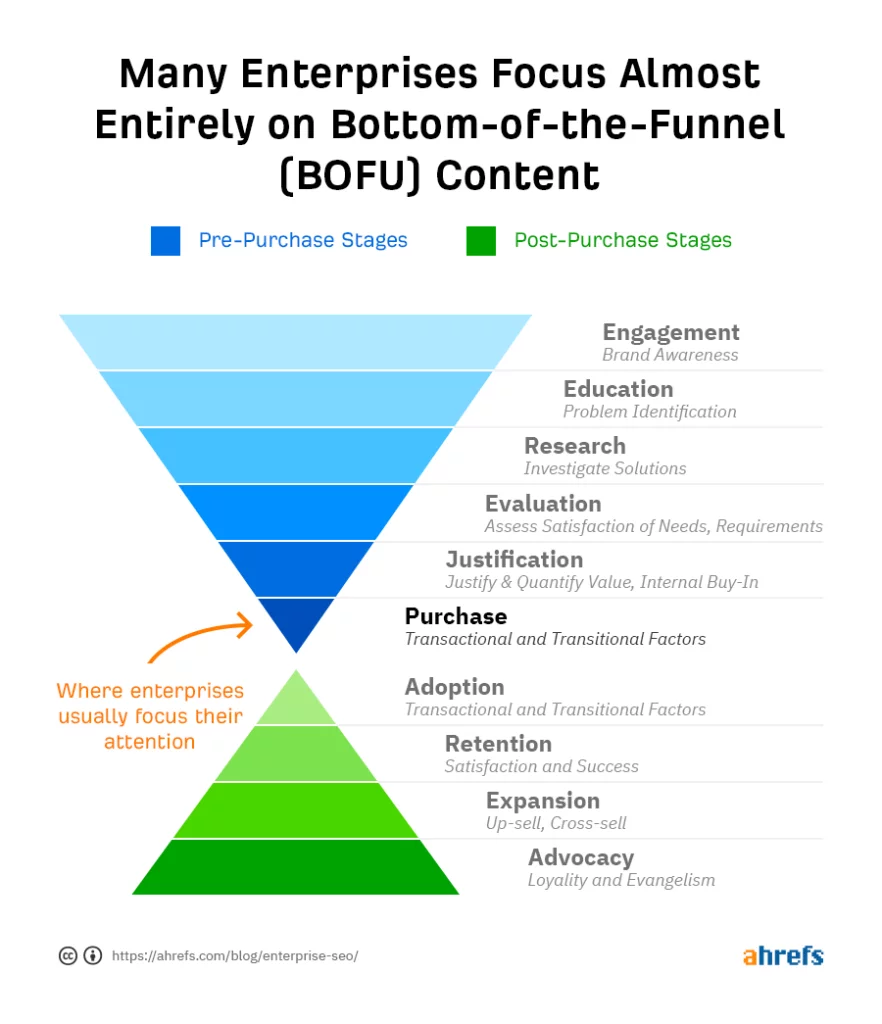
- Accelerate Goal Achievement: With SEO enterprise tools, the journey to your optimization goals becomes swifter and more efficient. These tools are designed to streamline processes, allowing you to achieve your objectives in less time while maximizing results.
- Comprehensive Functionality at Your Fingertips: The extensive array of functionalities offered by SEO enterprise tools is awe-inspiring. From conducting technical audits to unraveling intricate user experience challenges, these tools have you covered. Dive into backlink analysis, dissect competitor strategies, and harness ready-to-use solutions to enhance both PPC performance and organic traffic.
- Ready-Made Solutions for Empowered Performance: Imagine having solutions tailor-made for supercharging your PPC campaigns and augmenting your organic traffic. SEO enterprise tools don’t just provide insights; they offer actionable suggestions that can elevate your digital campaigns to new heights.
- Unveil the Power of Efficient Management: Managing the intricate web of SEO workflows becomes a breeze with these tools. They empower you with functions that allow you to orchestrate tasks with precision, ensuring nothing slips through the cracks and delivering a cohesive optimization strategy.
- Unlock Insights with Comprehensive Analytics: The true power of SEO enterprise tools lies in their ability to provide in-depth insights that go beyond surface-level data. Delve into trends, decode user intent, analyze geolocation data, and uncover hidden opportunities that could redefine your approach.
- Precision for Improved Website Structure: These tools are your compass, helping you navigate the intricate landscape of macro and micro issues within your website. Pinpoint areas for improvement, fine-tune your website’s structure, and configure it in an SEO-friendly manner that resonates with search engines and users alike.
Elevate your SEO game, harness the power of data-driven optimization, and propel your website to new heights of digital success.
Top 6 Enterprise SEO Tools:
1. SeoClarity
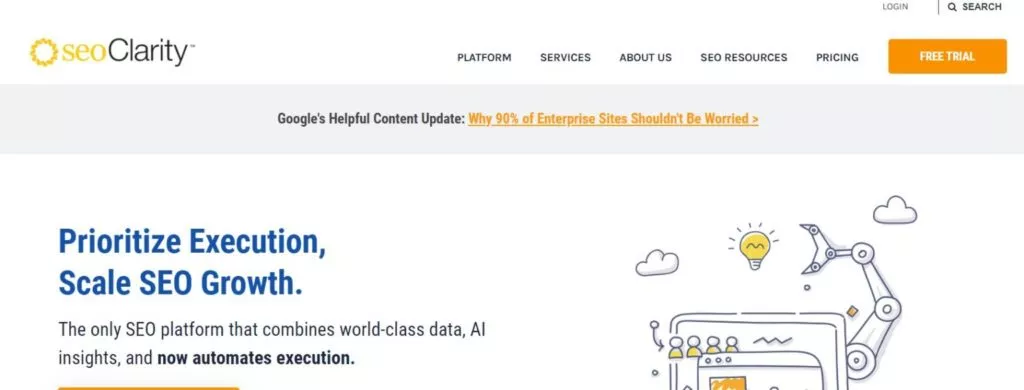
SeoClarity, established by Mitul Gandhi and Kalpesh Guard in 2007, emerges as a project that’s laser-focused on assisting entrepreneurs in elevating their online businesses through potent SEO campaigns. The platform boasts an array of clients that include notable names like Drizly, Fender, SpareFoot, and PM Digital.. These industry players trust SeoClarity to enhance their digital footprint and drive substantial results.
One of the standout features of SeoClarity lies in its innovative application of machine learning (ML) algorithms for keyword segmentation. This translates to a refined approach to keyword management, ensuring that businesses can target their audience with precision. The integration of ML technology bolsters the tool’s capabilities, making it a robust solution for businesses seeking data-driven insights to steer their SEO strategies.
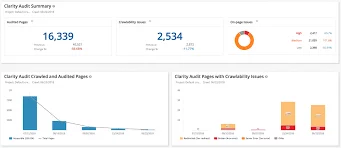
A pivotal attribute that sets SeoClarity apart is its heightened focus on enterprise-level security measures. With the growing importance of data privacy and compliance, the inclusion of measures aligned with General Data Protection Regulation (GDPR) guidelines and Single Sign-On (SSO) authentication ensures that sensitive information remains secure. This aspect is crucial for businesses operating at scale, where data protection and security are paramount.
Pros:
- Keyword Segmentation with ML: The incorporation of machine learning algorithms for keyword segmentation enhances precision in targeting, resulting in more effective SEO campaigns.
- Client Portfolio: SeoClarity’s impressive client list, including industry giants like Drizly and Fender, speaks to its ability to deliver results for established businesses.
- Enterprise Security Measures: GDPR and SSO integration ensures robust security for sensitive data, addressing the critical need for data protection.
Cons:
- Learning Curve: Implementing ML algorithms and utilizing enterprise-level security features might require a learning curve for some users.
- Complexity for Smaller Businesses: The robust enterprise features might be more complex and extensive than necessary for smaller businesses with simpler SEO needs.
2. Conductor
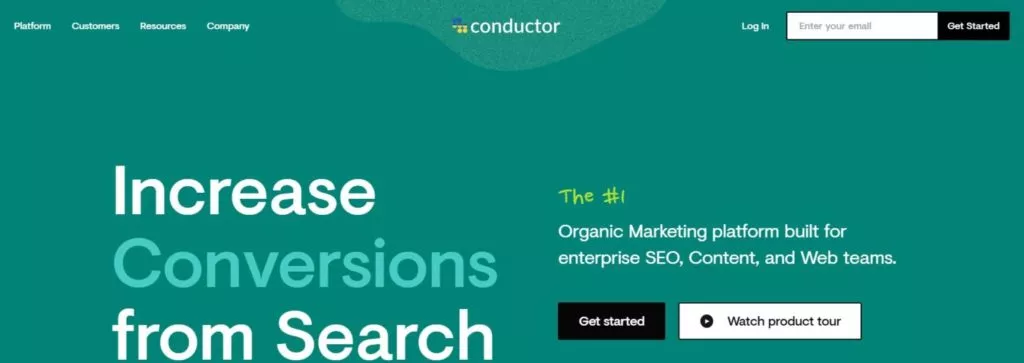
Conductor, established by Seth Besmertnik in 2011, is a dynamic platform with a dual focus: catalyzing marketing transformations and enhancing workforce capabilities. This multifaceted approach is reflected in Conductor’s mission, which goes beyond conventional SEO tools. This enterprise-level solution draws the attention and trust of prominent entities such as Siemens, Coursera, Totango, and HP., making it an enticing choice for businesses seeking impactful SEO strategies that align with overarching organizational goals
A hallmark of Conductor’s offering is the inclusion of a distinct feature: intelligent recommendations for crafting high-performance content on a large scale. This capability addresses a common challenge faced by enterprises – the need to generate compelling content at a volume that matches the scale of their operations. By providing data-driven insights and recommendations, Conductor facilitates the creation of content that resonates with audiences while maintaining consistency and alignment with SEO objectives.
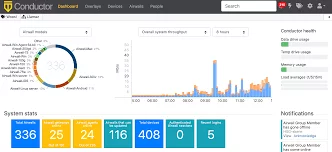
Beyond its strategic features, Conductor’s indexing prowess is noteworthy. With a staggering 20+ billion keywords in its index, including long-tail, question-based, and phrase match keywords, the tool ensures comprehensive coverage across diverse search contexts. This breadth enhances the accuracy of targeting, ensuring that businesses can capture a wide array of user intent.
Pros:
- Dual Mission: Conductor’s twofold focus on marketing transformations and workforce enhancements aligns SEO efforts with broader organizational objectives.
- Impressive Client Portfolio: The trust of established entities like Siemens and HP underscores Conductor’s ability to deliver results for enterprise-level businesses.
- Smart Content Recommendations: Intelligent suggestions for crafting high-performing content at scale empower businesses to address the challenge of content generation.
Cons:
- Learning Curve for Comprehensive Features: Utilizing advanced features like smart recommendations and navigating through comprehensive keyword indexes may require a learning curve.
3. SearchMetrics
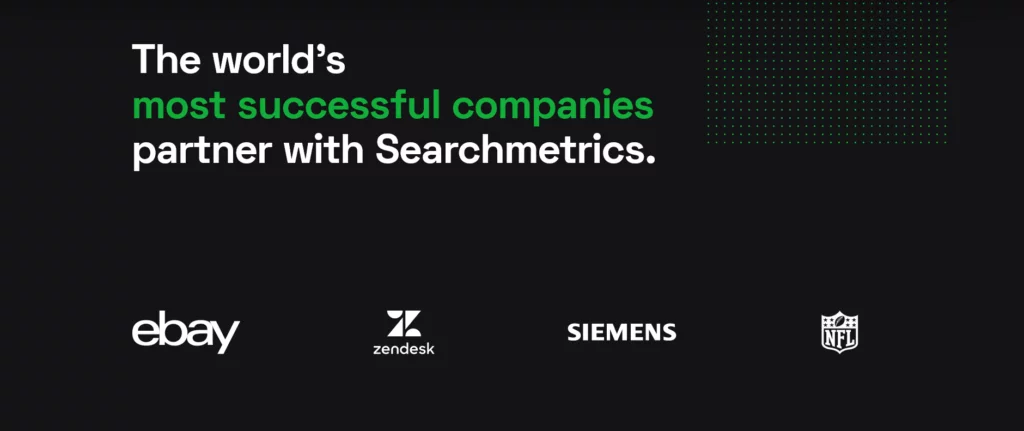
SearchMetrics, brought into existence by Matt Colebourne in 2014, stands as a testament to the mission of rendering enterprise-level website optimization a more economical and streamlined endeavor. The driving force behind SearchMetrics is the aspiration to bridge the gap between effective SEO strategies and budget-conscious efficiency. This commitment finds resonance with an array of users, including notable entities like Just Eat, Toyota, Sport1 and KARCHER
It has also introduced a distinctive facet to the landscape of enterprise SEO tools – the Research Cloud feature. This innovation is geared towards identifying gaps in website content, drawing insights from competitive analysis. By leveraging this feature, businesses gain a dynamic mechanism to discern where their content falls short in comparison to competitors. This insight-driven approach ensures that content creation efforts are not only strategic but also aligned with prevailing market trends and demands.

Beyond its focus on content optimization, SearchMetrics also extends its support through a comprehensive API. This integration-friendly approach allows users to seamlessly connect SearchMetrics with existing applications. This integration facilitates the implementation of SEO features across different touchpoints of an organization’s digital infrastructure.
Pros:
- Budget-Friendly Enterprise Optimization: SearchMetrics’ commitment to making enterprise-level website optimization more accessible and cost-effective resonates well with businesses seeking value-driven solutions.
- Diverse Client Base: The endorsement of esteemed names like Just Eat, Toyota, Sport1, and KARCHER adds credibility to SearchMetrics’ ability to cater to diverse industries and niches.
- Research Cloud Feature: The Research Cloud’s ability to identify content gaps based on competitive analysis empowers businesses to refine their content strategies with data-driven insights.
Cons:
- Learning Curve for Comprehensive Utilization: Navigating and fully utilizing features like the Research Cloud and API integration may require users to invest time in learning and adaptation.
4. MarketMuse
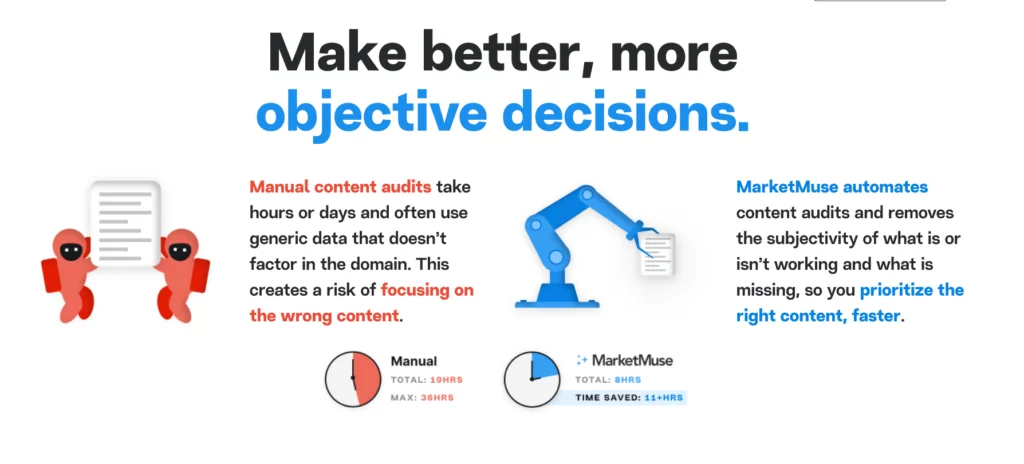
Introduced by Aki Balogh in 2013, MarketMuse emerges as an AI-powered SEO enterprise tool that encapsulates advanced capabilities to revolutionize content research and creation. Tailored to cater specifically to tech companies, it paves the way for constructing content-centric customer journeys. This transformational vision resonates strongly with prominent names in the industry, including ClickUp, Discover, Jabil and ISSA, who entrust MarketMuse to elevate their SEO strategies.
Central to MarketMuse’s offering is its pioneering integration of artificial intelligence (AI) into the realm of content planning. This hallmark feature empowers businesses to craft content plans that are not only strategic but also infused with the insights and predictive prowess of AI. This synergy enhances the precision of content creation, ensuring that it resonates with audiences while adhering to data-driven strategies.

A distinctive asset that MarketMuse brings to the table is its innovative Senior Vice President (SVP) for sales, an automated content inventory system. This strategic advantage facilitates streamlined content management, enabling businesses to assess, organize, and optimize their content assets with greater efficiency. This capability aligns with the overarching objective of building content-driven customer journeys, ensuring that content remains a potent tool for engaging users at every touchpoint.
Pros:
- AI-Powered Content Planning: MarketMuse’s AI-infused content plans underscore its commitment to data-driven precision in content creation, making it a compelling solution for tech companies seeking to resonate with their audience.
- Noteworthy Client Portfolio: The endorsement of well-established entities like ClickUp, Discover, Jabil, and ISSA bolsters MarketMuse’s credibility and capacity to deliver results for varied industry players.
- Automated Content Inventory: The SVP for sales, an automated content inventory system, adds an extra layer of efficiency to content management, aiding businesses in optimizing their content assets.
Cons:
- Learning Curve for AI Integration: Embracing AI for content planning may require users to familiarize themselves with its functionalities, which could necessitate a learning curve.
- Complexity for Smaller Businesses: The robust AI-powered features might be more extensive than required for smaller businesses with simpler content needs.
5. BrightEdge
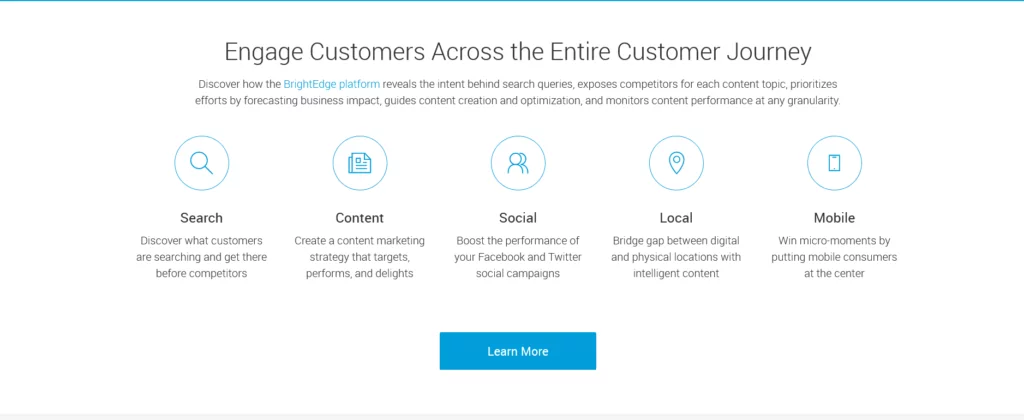
BrightEdge, introduced to the world by the collaborative efforts of Jim Yu and Lemuel Park, emerges as a compelling SEO enterprise tool that has garnered significant backing from notable venture capitalists in Silicon Valley. With a workforce that spans over 350 individuals, BrightEdge is no small player in the industry. The tool’s prowess is attested by esteemed users like L’Oréal, Twilio, Astute Solutions, Wiley, Adobe, solidifying its position as a preferred choice for businesses seeking comprehensive SEO solutions.
A defining facet of BrightEdge lies in its versatility. It caters not only to SEO professionals but also extends its reach to content marketers and executives across large and small companies. This all-encompassing approach underscores its commitment to facilitating holistic growth through SEO strategies that resonate across different roles and responsibilities.
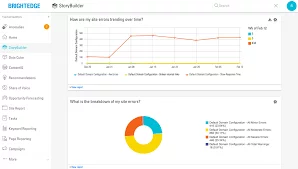
At its core, BrightEdge acts as a transformative catalyst for digital content. By harnessing its capabilities, businesses can seamlessly translate digital content into tangible outcomes – increased traffic, heightened engagement, and enhanced revenue streams. This alignment with tangible results positions BrightEdge as a solution that bridges the gap between SEO efforts and overarching business objectives.
One of the standout features that sets BrightEdge apart is its scalable SEO platform, fortified with an AI and machine learning engine. This integration empowers businesses to operate within a data-driven ecosystem, where insights gleaned from AI-powered analysis drive strategic decision-making.
Pros:
- Diverse User Base: BrightEdge’s appeal spans across SEO professionals, content marketers, and executives, making it a versatile solution for businesses of varying sizes.
- Impressive Clientele: Endorsement from industry giants like Loreal, Twilio, Astute Solutions, Wiley, and Adobe underscores BrightEdge’s ability to deliver results for established players.
- AI and Machine Learning Engine: The incorporation of AI and machine learning enhances BrightEdge’s analytical capabilities, driving informed decision-making.
Cons:
- Learning Curve for AI Utilization: Exploring and maximizing the AI-driven features may require users to invest time in understanding its functionalities.
6. Majestic
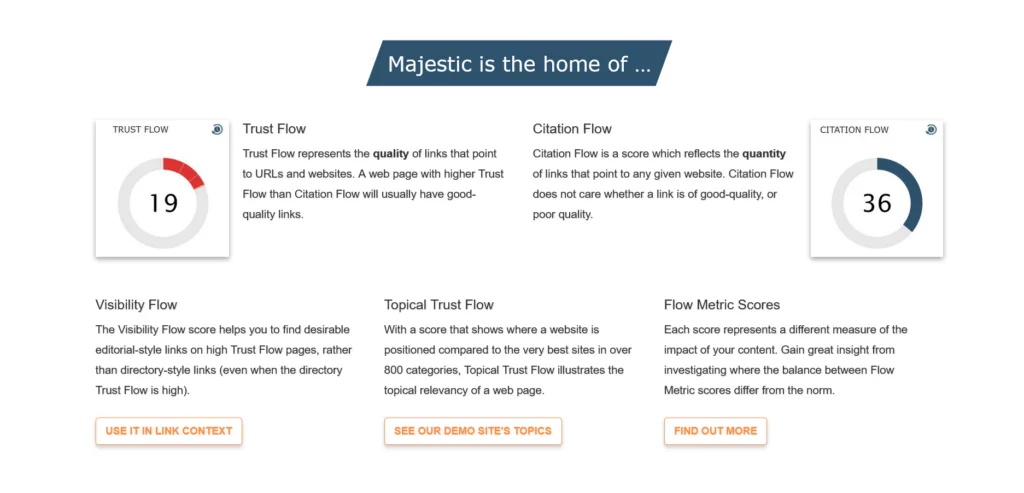
In 2009, Alex Chudnovsky set the wheels in motion for Majestic, an epitome of a Link Intelligence database that revolutionizes the landscape of backlink tracking. Positioned as a complementary asset to other enterprise-level search engine optimization tools, Majestic offers a specialized focus on backlinks, a critical facet of SEO strategy.
At its core, Majestic thrives on simplicity and efficiency. Utilizing this tool as a supplementary resource enhances the capabilities of your SEO toolkit. Once you input the requisite URL and initiate a check, a treasure trove of insights awaits. The link profile unveiled encompasses a spectrum of data points: external inbound links, referring domains, and a comprehensive breakdown of live, deleted, and duplicate links. This depth of information empowers businesses with actionable insights to refine their link-building strategies.
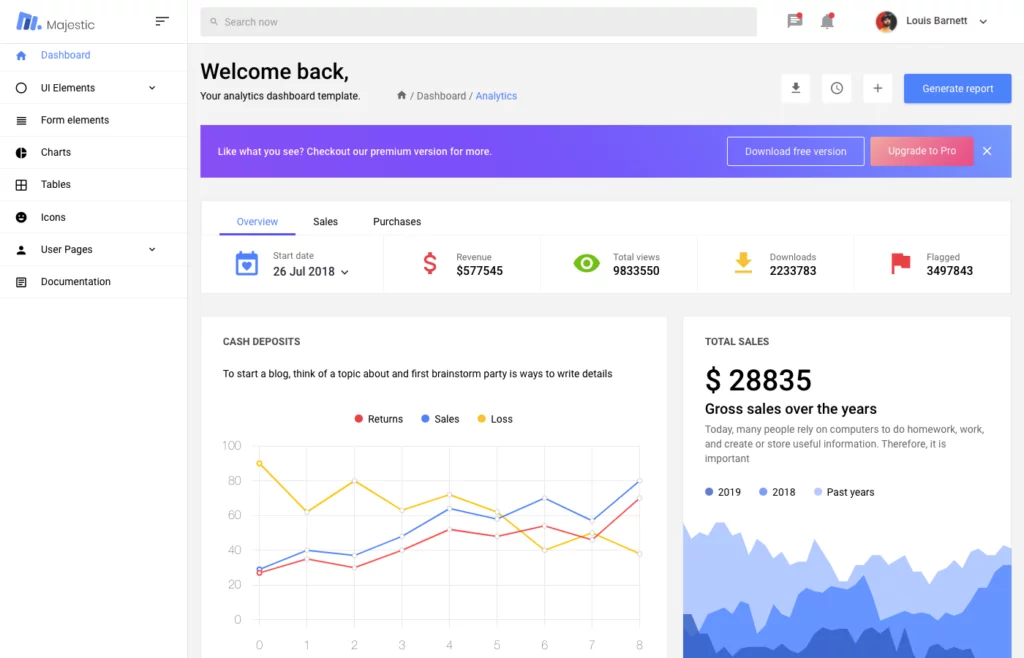
The efficacy of Majestic’s approach resonates with a diverse array of businesses. Renowned names like 360i LLC, 3M Co, Upwork Global Inc., Blackfriars Group trust Majestic to elevate their link intelligence and SEO initiatives. These endorsements speak to Majestic’s capacity to cater to varied industries and niches, emphasizing its versatility.
A hallmark feature that sets Majestic apart is its support for Trust Flow and Citation Flow metrics. These metrics, in essence, quantify the quality and quantity of links associated with a website. When Trust Flow surpasses Citation Flow, it signals a robust presence of high-quality links, indicative of strong domain authority.
Pros:
- Specialized Link Intelligence: Majestic’s exclusive focus on link analysis provides a specialized resource to enhance your SEO endeavors.
- Diverse Clientele: Majestic’s endorsements by Search Engine Optimization, Inc., 360i LLC, 3M Co, and others underscore its adaptability across diverse industries.
- Trust Flow and Citation Flow Metrics: The incorporation of these metrics provides a quantitative lens to assess the quality and quantity of links, aiding in strategic decision-making.
Cons:
- Narrow Focus: While Majestic excels in link intelligence, it’s essential to complement it with broader SEO tools for a comprehensive strategy.
7. Screaming Frog
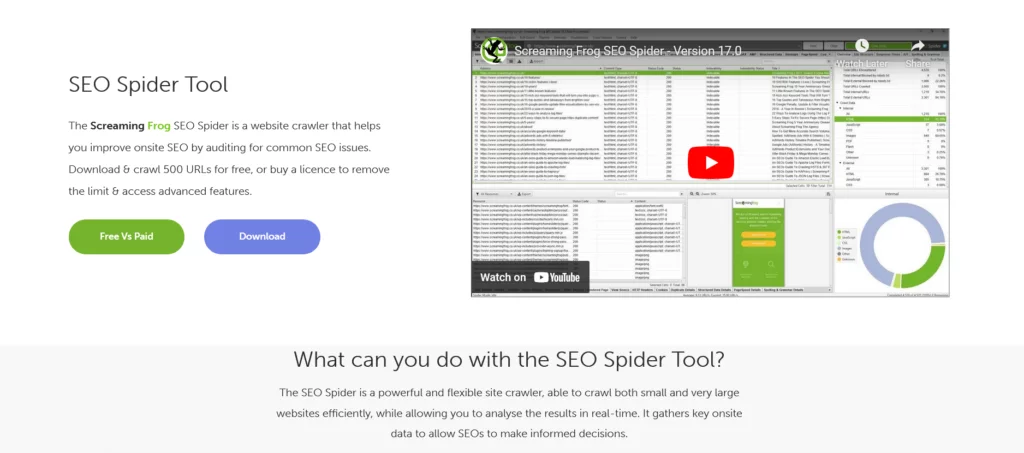
When it comes to meticulous website crawling and rigorous technical SEO analysis, Screaming Frog SEO Spider takes the lead. It serves as a digital detective for your website, relentlessly scouring through the digital corridors of your web presence to unearth critical insights. This tool shines in identifying on-page SEO issues with surgical precision, making it an indispensable asset for those keen on optimizing their websites for search engines. Beyond that, it excels in flagging and highlighting broken links and redirects, ensuring that your website’s user experience remains seamless. One standout feature that sets Screaming Frog SEO Spider apart is its absence of ongoing subscription costs, offering a budget-friendly option for those seeking comprehensive website analysis without the burden of recurring fees.
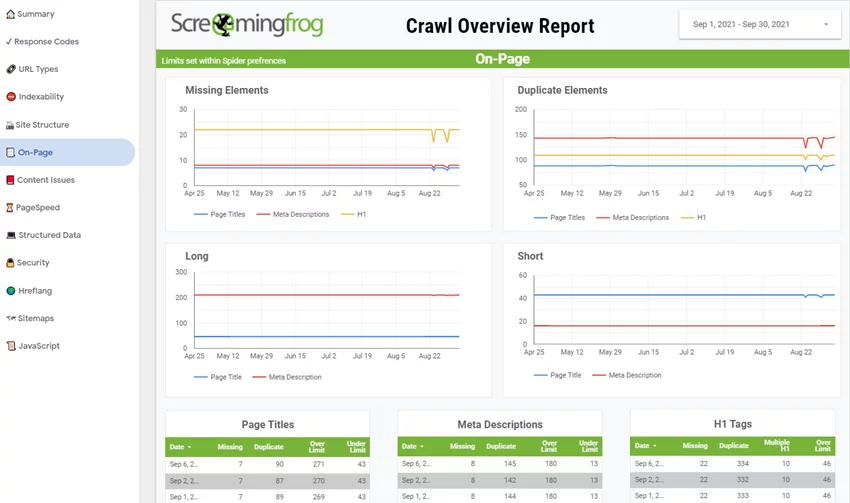
Pros:
- In-depth website crawling and technical analysis: It conducts thorough examinations of your website, leaving no digital stone unturned, and provides a deep dive into technical SEO aspects.
- Identifies on-page SEO issues effectively: With a keen eye for detail, it spots and reports on-page SEO problems, aiding in their swift resolution.
- Helps in identifying broken links and redirects: Ensures a smooth user experience by pinpointing and addressing issues related to broken links and redirects.
- No ongoing subscription costs: Provides a cost-effective solution for businesses and individuals looking for a one-time purchase option for comprehensive SEO analysis.
Cons:
- Doesn’t cover other aspects of SEO like keyword research or backlink analysis: While it excels in website crawling and technical analysis, it lacks the breadth of some other SEO tools that encompass keyword research and backlink analysis within a single platform.
- Not as user-friendly for non-technical users: Its depth and technical focus may pose challenges for those without a strong technical background, potentially requiring a learning curve.
8. Rank Ranger
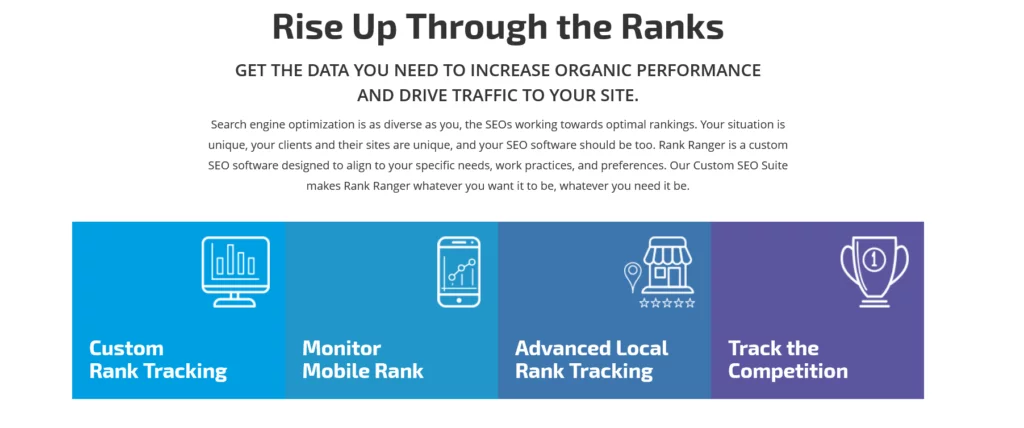
Rank Ranger is an enterprise-level SEO tool that offers a range of features designed to provide comprehensive insights into your website’s performance in search engine rankings and online presence. With customizable and detailed ranking reports, you can track your website’s progress over time, focusing on specific keywords, search engines, and regions that matter most to your business. The tool’s strength lies in its ability to conduct in-depth on-page SEO analysis, evaluating crucial elements like title tags, meta descriptions, header tags, and keyword usage. It doesn’t stop at analysis; Rank Ranger provides optimization suggestions to refine your content for better search engine visibility. Beyond traditional SEO metrics, you can measure social media engagement, content sharing trends, and understand the interplay between social media and your SEO efforts.
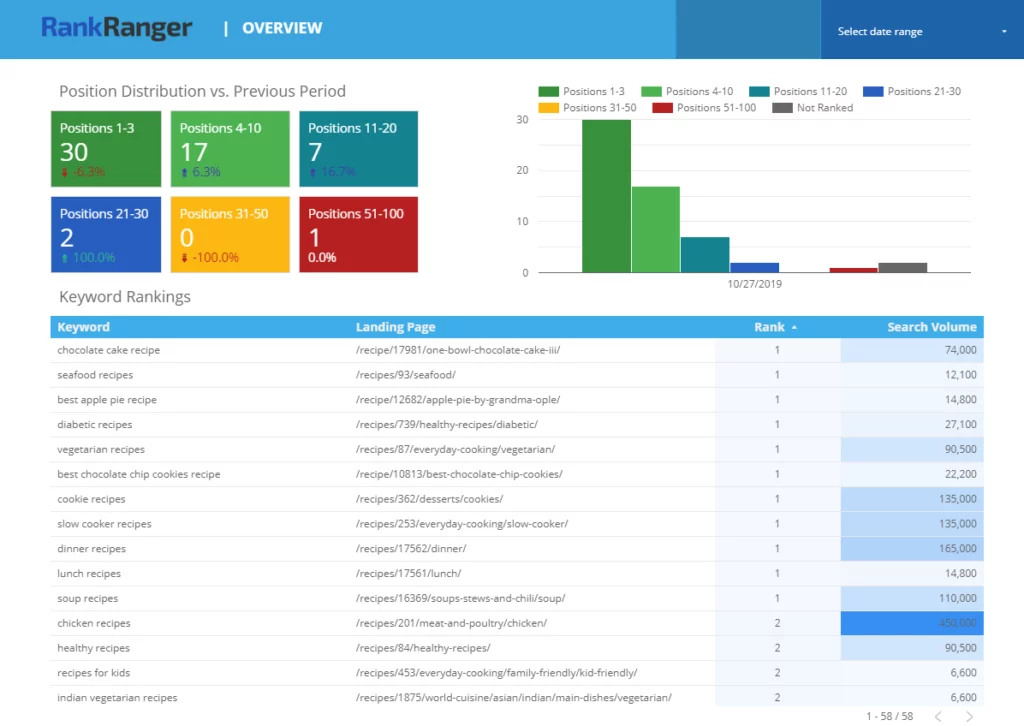
Pros:
- Customizable ranking reports: Tailor reports to your needs for precise insights into your SEO performance.
- On-page SEO analysis: Receive actionable optimization suggestions by evaluating crucial on-page elements.
- Local SEO tracking: Monitor and enhance your website’s performance in specific geographic areas.
- Integration of social media data: Gain a holistic view by incorporating social engagement metrics into your SEO analysis.
Cons:
- Learning curve: Users might face challenges initially due to a less intuitive interface.
- Backlink analysis limitations: Not as comprehensive as specialized tools for in-depth backlink insights.
Factors to Consider Before Choosing an Enterprise SEO Tool:
Source: SmartInsights
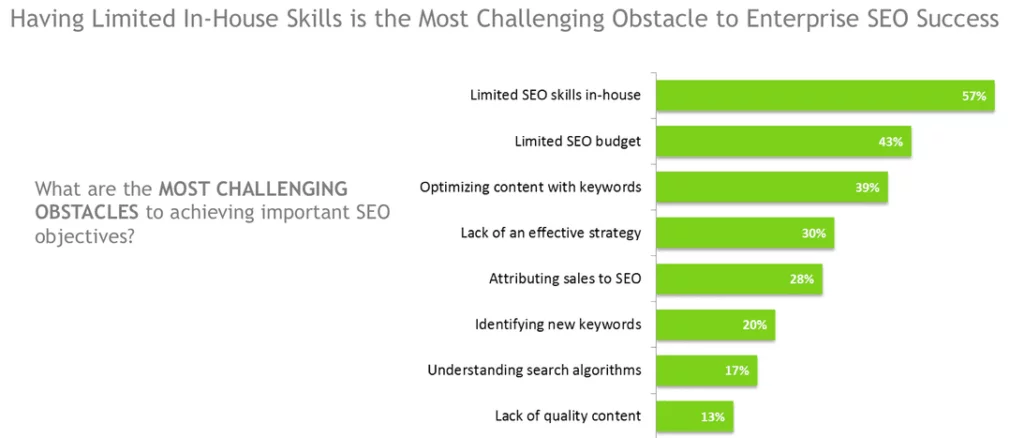
- Assess Your Business Resources and Needs: Before diving into enterprise SEO software, evaluate your business resources, staffing capabilities, and financial capacity. Remember that these tools won’t work miracles on their own. Consider the following tips:
- If you have an in-house marketing team, enterprise SEO software can be effectively integrated with your current solutions for optimized web resources.
- If you lack dedicated specialists, outsourcing SEO optimization to a third-party agency might be more beneficial.
- Justifying the implementation of enterprise software, which often comes with a significant annual investment, is crucial. Be prepared to demonstrate its efficiency to C-level managers.
- Plan for training your staff on the new solution. Ensure the software provides learning materials and reliable support to facilitate a smooth adoption process.
- Select Suitable Vendors and Request Demos: Conduct thorough research, such as reading informative articles and independent reviews, to compile a shortlist of potential options. Engage with 2-3 software providers to obtain quotes and request demo versions. This step provides hands-on experience with the tools’ functionalities.
- Test Multiple Solutions: Conduct an enterprise SEO platform comparison by testing the shortlisted solutions on the same website. Evaluate factors like ease of use, alignment with your must-have features, availability of detailed reports, and any other aspects that are crucial for your business.
- Check Reviews and Discuss Contracts: Before finalizing your decision, delve into user reviews and testimonials. These insights can unveil hidden strengths or challenges that might not be evident from the software’s website or demo. Thoroughly assess the feedback to make an informed choice.
- Integration Capabilities: Assess the compatibility of the enterprise SEO software with your existing tech stack. It should seamlessly integrate with your content management systems, analytics tools, and other marketing software. Integration streamlines data sharing and reporting, enhancing your overall SEO strategy.
- Data Accuracy and Reporting: Accurate data is the foundation of effective SEO. Ensure that the software provides reliable data collection and reporting mechanisms. It should offer comprehensive insights into website performance, keyword rankings, backlinks, and more. Access to real-time data is particularly valuable.
- Technical Support and Training: Reliable technical support is essential when adopting a new enterprise SEO tool. Confirm that the vendor offers prompt assistance in case of issues or questions. Additionally, check if they provide training resources, tutorials, or webinars to help your team maximize the tool’s potential.
- Budget and ROI Assessment: Carefully evaluate the cost of the enterprise SEO software against the expected return on investment (ROI). Calculate how much value the tool can bring in terms of increased organic traffic, higher rankings, and improved conversions. A well-planned budget ensures you make a cost-effective choice.
- Contract Flexibility: Review the terms and conditions of the software contract. Pay attention to factors like contract duration, renewal options, and exit strategies. Having flexibility in your contract can be beneficial, especially if your business circumstances change.
- Security and Compliance: Given the importance of data security and privacy, verify that the SEO tool adheres to industry standards and compliance regulations. Protecting your website and user data is non-negotiable.
Conclusion:
In the competitive online landscape, staying ahead requires more than manual SEO efforts. Enterprise SEO tools are the key to unlocking the full potential of your digital marketing strategy. With their ability to provide actionable insights, automate reporting, and deliver comprehensive analytics, these tools are indispensable for enterprises looking to succeed in the digital age.
As technology evolves and search engine algorithms change, the importance of enterprise SEO tools will only continue to grow. Embracing these tools means embracing the future of digital marketing—a future where data-driven decisions and optimized websites reign supreme.
FAQs on Enterprise SEO Tools:
Can enterprise SEO tools integrate with other marketing software?
Yes, many enterprise SEO tools offer integrations with other marketing software and platforms, allowing businesses to create a seamless workflow. Integration with tools like content management systems (CMS), email marketing platforms, and analytics tools can enhance overall marketing efforts.
Can I measure the ROI of using an enterprise SEO tool?
Yes, measuring the return on investment (ROI) of using an enterprise SEO tool is possible. You can track changes in search engine rankings, organic traffic, and website performance to determine the tool’s impact on your business. Additionally, monitoring the time and resources saved through automation can contribute to ROI assessment.
Are enterprise SEO tools suitable for small businesses?
Enterprise SEO tools are designed to meet the needs of larger organizations with complex websites and extensive online presence. Small businesses may find that simpler, more cost-effective SEO tools better suit their requirements. It’s essential to choose a tool that aligns with your business size and goals.



